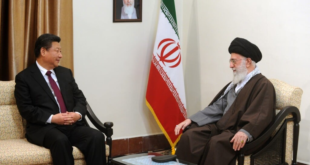Beijing Isn’t Just Building Roads—It’s Making Friends
When U.S. policymakers consider China’s influence in Africa, they often think of big-ticket infrastructure development programs such as the Belt and Road Initiative (BRI). Over the past two decades, Beijing has spent billions building dams, highways, railways, and ports in countries from Egypt to South Africa.
But those sorts of projects are only part of the story. China’s evolving presence in Africa, including the BRI, is based as much on investment in building social and human capital as it is on giant infrastructure projects. Since the beginning of this century, Beijing has invested heavily in cultivating political, educational, and institutional relationships with leaders and citizens in almost all African countries with which it has diplomatic relations. As similar opportunities for Africans with Western states have declined, China has stepped into the breach.
To its own detriment, Washington has failed to fully reckon with these less visible elements of Beijing’s diplomacy. If the administration of President Joe Biden is serious about countering Chinese influence across the developing world, it would do well to understand how China’s policies actually work and the benefits that the country stands to gain from its efforts in Africa—and across the globe.
GOING TOGETHER
Many U.S. officials, policymakers, and experts have raised concerns about China’s loans, investments, and infrastructure projects worldwide. In response, the Biden administration announced the Build Back Better World plan (B3W)—a global infrastructure program meant to counter China’s influence in the global South—at the G-7 meeting in June 2021. B3W is designed to outperform Beijing by offering alternative investment projects intended to entice countries into choosing the United States over China as their preferred partner.
The administration’s plans, however, reflect a narrow understanding of China’s global role. Although Beijing has poured billions of dollars into infrastructure projects across the developing world, it has also invested heavily in developing relationships and people-to-people connections with political, security, and business elites in many African countries. To be sure, the Chinese Communist Party (CCP)’s engagement with the global South dates back to the Mao era, but the scope of these exchanges has accelerated rapidly. As of 2018, for instance, more than 80,000 African students were studying in China, compared with fewer than 2,000 in 2003. These scholarships are designed to improve China’s image overseas and showcase its development success story to visiting students.
Since 2018, moreover, the Chinese government has invested heavily in a series of annual visits to China for African government officials and defense attachés. High-ranking delegations from 50 African countries spend two weeks in China attending seminars and visiting People’s Liberation Army, PLA Navy, and PLA Air Force sites to learn more about China’s military capabilities. In 2018, as part of these exchanges, all sides agreed to expand Chinese-hosted trainings for African peacekeeping and police forces. For Beijing, these emerging military-to-military relationships represent an important investment in the future of Chinese diplomacy. If properly cultivated, such networks can build trust between Chinese and African militaries—and also yield potentially lucrative arms deals.
The Biden administration’s plans reflect a narrow understanding of China’s global role.
Beyond these extensive exchange programs, the CCP frequently sponsors trainings and seminars for civilian political party elites from across the continent. These programs are designed to teach leaders about the CCP’s approach to development, party leadership, and political organization. Typically, such opportunities also address the role of technology in governance, which presents an opportunity for Chinese technology companies to market their products.
Beijing has also sponsored a series of joint research initiatives between Chinese and African universities and think tanks—including partnerships with schools in 46 African countries that currently host Confucius Institutes, a network of state-sponsored Chinese language and cultural centers. These partnerships are meant to improve exposure to Chinese culture, history, and language across the continent. For the Chinese government, such programs also represent one way of reversing Western hostility to the country’s development model and reducing Beijing’s image deficit abroad.
Finally—and perhaps most notable—Chinese and African officials have launched a number of prominent multilateral events, including the Forum on China-Africa Cooperation. The FOCAC meeting, held every three years, is now one of the largest regular diplomatic gatherings of African leaders. The United States, by contrast, hasn’t convened a comparable event since the Obama administration’s 2014 U.S.-Africa Leaders Summit in Washington, D.C.
Like the BRI, the FOCAC is not focused just on developing joint infrastructure and lending programs. The forum is also designed to grow and deepen people-to-people connections between African countries and China. During the 2018 FOCAC meeting, for example, Beijing pledged to sponsor 50,000 new training opportunities for African professionals in the information technology, energy, tourism, and disaster relief sectors; announced a new cooperation plan between Chinese and African universities; and launched several training programs for African law enforcement personnel. Although limited by COVID-19 pandemic travel restrictions, FOCAC 2021, held in Senegal, produced a similar set of commitments.
A BRIDGE TO SOMEWHERE
Taken together, these activities represent a formidable expansion of China’s influence across the continent. Beijing’s efforts are already paying dividends. Today, 63 percent of Africans view China’s influence in the continent as “somewhat positive” or “very positive,” and China is now the preferred development model for a growing number of countries, including Benin, Botswana, Burkina Faso, and Mali.
Beyond measures of popularity, however, China’s diplomacy—including forums such as FOCAC—serves several other crucial purposes. For one, when hosted in China, these gatherings showcase Beijing’s development model. China’s booming e-commerce platforms, new infrastructure, and use of technology in governance are all on display to those who visit. The opportunity to “show and tell” China’s success helps government officials shape the narrative about Beijing’s growth and its potential applicability beyond China’s borders.
Washington downplays Beijing’s social and human capital investments in Africa at its own risk.
Forum diplomacy is therefore an ideal way of marketing Chinese products, practices, and norms. Several countries have already taken Beijing’s way to heart. With Chinese support, political parties in South Africa and Tanzania have opened training academies modeled after the CCP’s party schools (which train future party cadres), including the Julius Nyerere Leadership School near Dar es Salaam and an institute outside of Johannesburg sponsored by the African National Congress. Chinese-trained educators also founded Uganda’s Luyanzi Institute of Technology, a vocational training school near Kampala.
The benefits of Chinese diplomacy aren’t limited to these institutional outcomes, however. Testimony from students who attend Chinese schools on government-sponsored scholarships suggests that recipients frequently work to improve bilateral relations with China upon their return home. Proficiency in Mandarin is another straightforward way that this plays out: in non-Anglophone African countries, communicating with Chinese counterparts can be complicated. Civil servants with language skills and an understanding of Chinese culture inevitably facilitate smoother communication and collaboration on complex projects.
HUMAN CAPITAL MATTERS
Today, Washington downplays Beijing’s social and human capital investments in Africa at its own risk. These programs have quickly become a central pillar of China’s foreign-policy making in Africa, and they will continue to operate well into the future. Such efforts also address a growing need, as the number of U.S. and European scholarships, visas, and exchange programs available to citizens from African countries decreases and anti-immigrant sentiment in the United States and Europe rises.
China is beginning to fill this vacuum across a range of sectors. According to a recent UNESCO report, for example, 16 percent of all scholarships for citizens from African countries to study abroad were sponsored by the Chinese government—making Beijing the single largest provider. Even among wealthy members of the Organization for Economic Cooperation and Development, the United States trailed in fifth place. If Washington is serious about improving its relationship with the African continent, increasing educational opportunities for African students is a good place to start.
If Biden’s B3W plan stands a chance of transforming Washington’s relationship with the developing world, his administration must realize the power of building people-to-people connections. Policymakers must take seriously the importance of investing in long-term relations with everyday citizens in countries across Africa and elsewhere, regardless of their governments’ ideologies. Divisive events such as the Summit for Democracy, by contrast, can end up pushing excluded countries closer to Beijing. Programs that focus on human capital development aren’t just the right thing to do; they’re also sound policy.
 Eurasia Press & News
Eurasia Press & News




